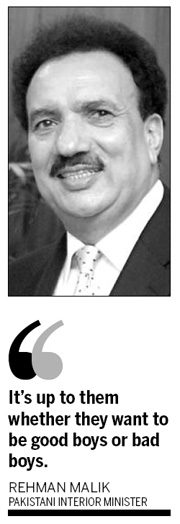Help wanted for Pakistan's terror fight
Pakistan is calling for more international support for its anti-terrorism efforts, as an unstable central Asia would be disastrous for the whole world.
 |
In an interview with China Daily on Thursday, visiting Pakistani Interior Minister Rehman Malik also urged terrorists to give up their weapons and have dialogue with his government.
"The international community must know that if Pakistan and Afghanistan are destabilized through acts of terrorism, the whole region will not remain peaceful and world peace will be threatened," said Malik, who is on a two-day official visit to Beijing at the invitation of the Ministry of Public Security.
He said Pakistan hopes the international community "increases its efforts" in helping Pakistan enhance its police and intelligence capabilities.
More than nine years after the US started its war-on-terror in Afghanistan, neighboring Pakistan finds itself deeply trapped, too.
About five million refugees have fled Afghanistan and crossed into Pakistan, Malik said. The two countries share a border of about 2,500 km.
Also, Pakistan saw more than 3,000 deaths in terror attacks in 2009, up 48 percent on the year before, according to a report by the Pakistan Institute for Peace Studies.
Faced with the daunting challenge, Malik stressed his homeland is implementing a "three-Ds strategy: Development, Deterrence and Dialogue", initiated by Pakistani Prime Minister Yusuf Raza Gilani, and directed toward terrorists, including the Pakistani Taliban.
Despite some major combat against insurgents in the country's tribal areas in 2009, no dialogue was held between them and the government, Malik said, adding he "did receive three offers" from the "gangsters".
"We will not talk to the Taliban until and unless they drop their arms. This is our condition," he said.
Malik said the government is ready to talk with the Taliban once they disarm. "Those who have committed heinous crimes should be taken to task. Those who are not involved but have been forced into it, of course, the government can consider giving them some kind of concession."
"It's up to them whether they want to be good boys or bad boys," he added.
But it's unlikely the Pakistani Taliban will become good boys, according to Ye Hailin, an Asian studies expert at Chinese Academy of Social Sciences.
The Pakistani Taliban "lack a clear political aim" compared to the Taliban in Afghanistan, Ye said.
"The Pakistani Taliban are very much opportunists, they talk to the government when they are too weak to fight, but once they gain more power they will start attacking again. This has been their strategy for a long time and it is not likely to change soon," he added.
No confirmation on Taliban chief's death
In the same interview, Malik also said he could not confirm if Hakimullah Mehsud is alive or dead.
The Pakistani Taliban chief, who was reportedly killed by a US-led drone attack in Pakistan in January, resurfaced in a recent video seemingly recorded in April.
He said American cities would be his group's main targets.
Commenting on the clip, Malik said there is "a great deal of information" that he's dead, even though "we do not have the confirmation".
In an interview with Reuters on Thursday, Malik said it was unlikely a Pakistani-American arrested over a failed plot to bomb New York's Times Square had acted alone.
Investigations in Pakistan had uncovered possible links between the suspect, Faisal Shahzad, 30, the Pakistani Taliban and a Kashmiri Islamist group, officials and news reports said.
"He says it was his individual act," Malik said. "I would not tend to believe that."
 0
0 







Go to Forum >>0 Comments